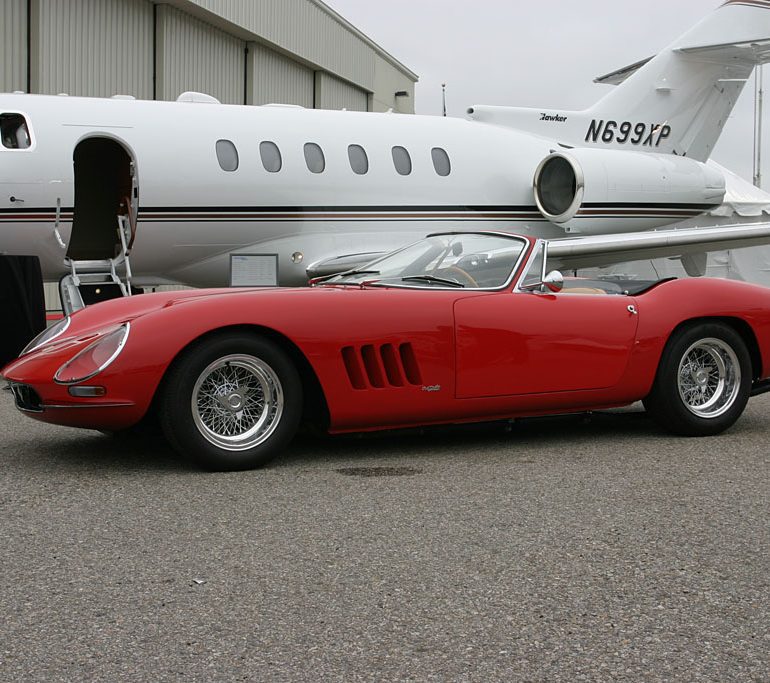1960 Ferrari 250 GT Nembo Spyder
Of all the Ferrars made by Neri & Bonacini, the small series of Nembo Spyders was their greatest. From a small shop in Modena, they transformed unwanted Ferrari chassis into something much more special. Built on the 250 GT platform, the Nembos were influenced by the Ferrari GTO, but featured distinctive proportions.
With help from Anselmo Genilini, the partnership between Giorgo Neri and Luciano Bonacini was capable of producing full scale projects. Both Neri and Bonacini had worked for Maserati’s defunct racing department and met Genilini at Ferrari. By 1962, the company was in full swing and Genilini was head of the body shop.
1966 saw the debut of two fabulous cars from the firm: a Lamborghini Monza 2+2 and the Nembo Ferraris. Both benefited from occasional factory visits by Giotto Bizzarrini and Giampaolo Dalara.
The first Nembo Ferrari debuted in 1966 and was a named after a contraction of the partners last names. It was built upon Ferrari chassis 1623GT and resembled Drogo’s own Ferrari design. This sleek Coupe was followed up by three more spyders: 1777GT, 3771GT and 5805GT over a 330 chassis.
All these cars were carefully constructed, period re-bodies that made their donor cars look staid by comparison.
Chassis & Sales
At their London Automobile Auction, RM Auctions sold Nembo Spyder Chassis No. 1777 GT for 660.000GPB. Below are some excerpts from their catalogue description:
“1777 GT was brought forth by two protagonists; the first was Tom Meade, a free-spirited Californian who settled in the villaggio artigiano to create his own interpretations of Ferrari bodies, most notably the Thomassimas (one of which graced a cover of Road & Track in 1970). He certainly had talent and an eye for flamboyant design, qualities noted by Richard Merritt, who was the founder of the Ferrari Club of America, and a regular Modena visitor. To supplement his cash flow Tom became a source of used Ferraris and Maseratis for clients in Europe and the US.
The second key figure in the creation of the Nembo Spyder was Sergio Braidi. Little is known about Braidi other than the fact that he wanted a spectacular Ferrari spyder along the lines of a 250 GTO 1964 version, but without the roof, and that aesthetically is what 1777GT is. Indeed Tom Meade claims no design influence for it and actually almost used an actual GTO as the basis for the Nembo Spyder, since GTOs were then just obsolete racing cars and at least one or two passed through his hands. The pair eventually settled for a 1960 250 GT Pininfarina Cabriolet, Series II, whose was M. Moratti Jr. Meade recalls: “It had a normal 3 carburetor setup except that the air cleaner was cut way down to provide much lower hood clearance”
“With their experience and characteristic talent, the car was soon ready, seen in period photos first with Bonacini’s ‘MO103 Prova’ plate and soon after with MO14 2381. It was at some point fitted with a replacement engine 2271GT-with six twin-choke Weber carburettors, probably by Neri & Bonacini, although it is also possible this change was made later.
The resulting car, painted dark blue, was stunning, and as stated by the late historian Stan Nowak, ‘Of all the specials not authorized by the factory [no. 1777 GT], must be considered the most successful, or at least the most visually attractive. Luigi Chinetti did see it and it did inspire the creation of the NART Spyder which it resembles.”
”1777 GT was the first and indubitably the most important of the Nembos. There was another less attractive spyder on a shorter chassis, 3771 GT, and the Nembo coupe, 1623 GT. There was a third spyder, possibly 2707 GT, with a shark nose, which left Modena for Lebanon when new, as a bare body shell, and vanished.”
1960 Ferrari 250 GT Nembo Spyder Gallery
See full 1960 Ferrari 250 GT Nembo Spyder Gallery here
Story by RMAuctions, Supercars.net
In Detail
| type | Limited Production Car |
| built at | Modena, Italy |
| coachbuilder | Neri & Bonacini S.d.f. |
| engineers | Anselmo Genilini |
| production | 3 |
| engine | V12 |
| position | Front Longitudinal |
| aspiration | Natural |
| valvetrain | SOHC, 2 Valves per Cyl |
| fuel feed | 6 Twin Choke Weber Carburettors |
| displacement | 2953 cc / 180.2 in³ |
| bore | 73 mm / 2.87 in |
| stroke | 58.8 mm / 2.31 in |
| power | 193.9 kw / 260 bhp |
| specific output | 88.05 bhp per litre |
| body / frame | Body over Steel Tube Frame |
| driven wheels | RWD |
| front brakes | Drums |
| rear brakes | Drums |
| f suspension | Independant w/Coil Springs, Houdaille Hydraulic Shock Absorbers |
| r suspension | Live Axle w/Semi-Elliptical Springs, Trailing Arms, Houdaille Hydraulic Shock Absorbers |
| wheelbase | 2400 mm / 94.5 in |
| transmission | 4-Speed Manual w/Overdrive |




